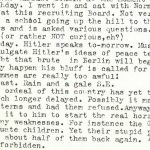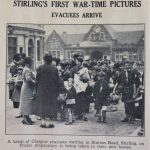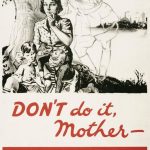In amongst the more mundane thoughts, such as reporting on the weather and his ongoing distaste for the BBC war coverage, Graham writes about a new role that he will be undertaking. After previously expressing his wish to be able to participate more fully in helping with the war effort, Graham informs us of a meeting he has had with a Mr Orr-Ewing to discuss his assistance with the recruitment of men to the army. He quips “curious how few want the Infantry! (or rather NOT curious, eh?)” He provides more details of this position at the end of the week.
Another topic that Thomas discusses is the evacuation policy, and how much he is against the returning of children to their families in the city. He states “The Govt (sic) payed millions to evacuate children. Yet their stupid parents have been allowed to take about half of them back again. This SHOULD have been peremptorily forbidden”.
At the time of Graham’s entry, this was just the start of the process. As the bombing raids which had been anticipated at the outbreak of war failed to materialise, families wanted to be reunited, and by January 1940, almost half of the 1.5 million children who were evacuated in those first few days had been returned home. Posters like the one above were produced by the government to try to urge parents to leave their children in the much safer rural areas until the threat was significantly diminished or removed completely.
The bombing and “threat from the air” that Graham had long feared did of course come to pass with events such as The Blitz in London and the bombing of many other cities and targets of military or strategic importance, such as Clydebank, and causing many civilian casualties.
Sources used:


